英语被动语态知识归纳
- 格式:doc
- 大小:70.00 KB
- 文档页数:27
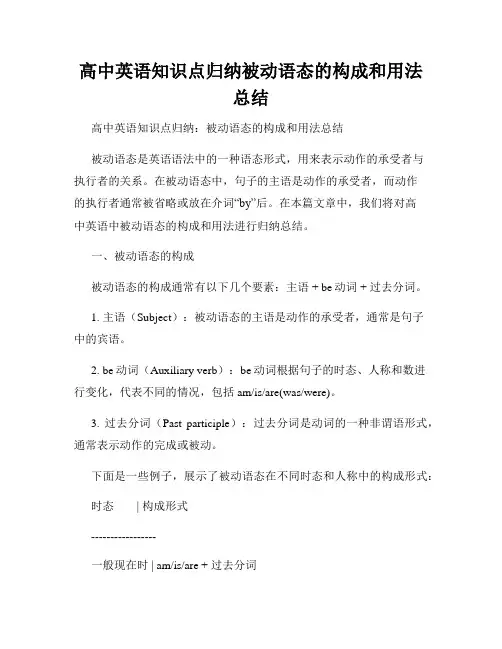
高中英语知识点归纳被动语态的构成和用法总结高中英语知识点归纳:被动语态的构成和用法总结被动语态是英语语法中的一种语态形式,用来表示动作的承受者与执行者的关系。
在被动语态中,句子的主语是动作的承受者,而动作的执行者通常被省略或放在介词“by”后。
在本篇文章中,我们将对高中英语中被动语态的构成和用法进行归纳总结。
一、被动语态的构成被动语态的构成通常有以下几个要素:主语 + be动词 + 过去分词。
1. 主语(Subject):被动语态的主语是动作的承受者,通常是句子中的宾语。
2. be动词(Auxiliary verb):be动词根据句子的时态、人称和数进行变化,代表不同的情况,包括am/is/are(was/were)。
3. 过去分词(Past participle):过去分词是动词的一种非谓语形式,通常表示动作的完成或被动。
下面是一些例子,展示了被动语态在不同时态和人称中的构成形式:时态 | 构成形式-----------------一般现在时 | am/is/are + 过去分词一般过去时 | was/were + 过去分词一般将来时 | will be + 过去分词现在进行时 | am/is/are + being + 过去分词过去进行时 | was/were + being + 过去分词现在完成时 | have/has been + 过去分词过去完成时 | had been + 过去分词二、被动语态的用法被动语态在英语中有着广泛的应用。
以下是几种常见的使用情况:1. 强调动作的承受者:被动语态可以突出句子中动作的承受者,使其成为句子的主要焦点。
例如:- The house was destroyed by the earthquake.(房子被地震摧毁了。
) - The book was written by a famous author.(这本书是由一位著名作家写的。
)2. 描述客观事实:当注重描述客观事实时,被动语态可以更加准确地传达信息。
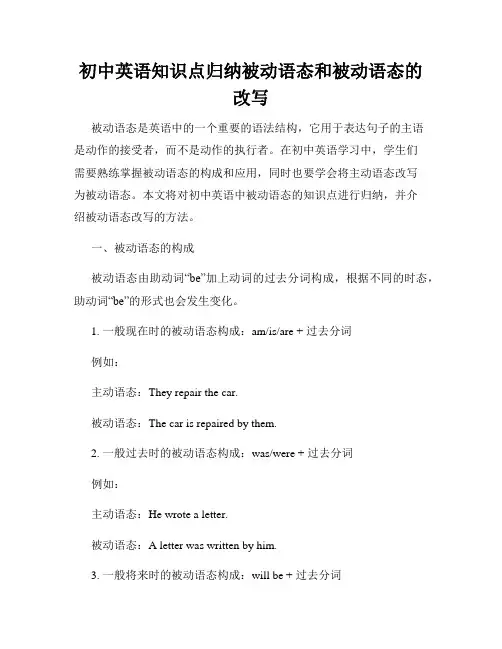
初中英语知识点归纳被动语态和被动语态的改写被动语态是英语中的一个重要的语法结构,它用于表达句子的主语是动作的接受者,而不是动作的执行者。
在初中英语学习中,学生们需要熟练掌握被动语态的构成和应用,同时也要学会将主动语态改写为被动语态。
本文将对初中英语中被动语态的知识点进行归纳,并介绍被动语态改写的方法。
一、被动语态的构成被动语态由助动词“be”加上动词的过去分词构成,根据不同的时态,助动词“be”的形式也会发生变化。
1. 一般现在时的被动语态构成:am/is/are + 过去分词例如:主动语态:They repair the car.被动语态:The car is repaired by them.2. 一般过去时的被动语态构成:was/were + 过去分词例如:主动语态:He wrote a letter.被动语态:A letter was written by him.3. 一般将来时的被动语态构成:will be + 过去分词例如:主动语态:They will finish the project.被动语态:The project will be finished by them.4. 现在完成时的被动语态构成:has/have been + 过去分词例如:主动语态:She has cleaned the room.被动语态:The room has been cleaned by her.二、被动语态的应用被动语态在英语中的应用广泛,主要用于以下几个方面:1. 强调动作的接受者被动语态强调的是动作的接受者,使句子更加客观明确。
例如:主动语态:Tom broke the vase.被动语态:The vase was broken by Tom.2. 忽略动作的执行者当我们不关心或不知道动作的执行者是谁时,可以使用被动语态。
例如:主动语态:Someone has stolen my wallet.被动语态:My wallet has been stolen.3. 对普遍真理的陈述在表示普遍真理或规则时,常使用被动语态。
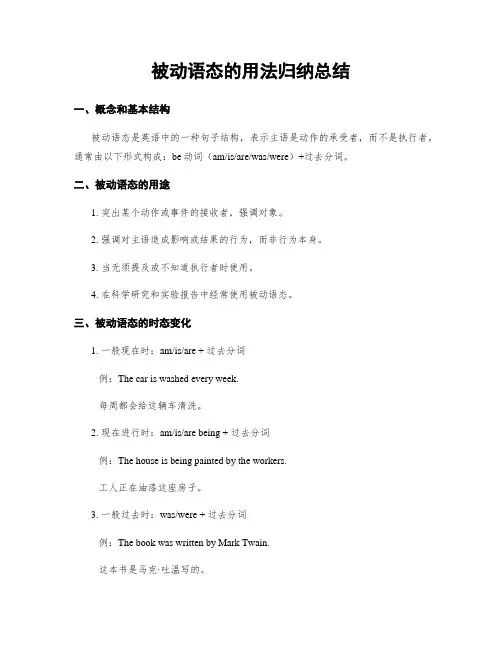
被动语态的用法归纳总结一、概念和基本结构被动语态是英语中的一种句子结构,表示主语是动作的承受者,而不是执行者。
通常由以下形式构成:be动词(am/is/are/was/were)+过去分词。
二、被动语态的用途1. 突出某个动作或事件的接收者,强调对象。
2. 强调对主语造成影响或结果的行为,而非行为本身。
3. 当无须提及或不知道执行者时使用。
4. 在科学研究和实验报告中经常使用被动语态。
三、被动语态的时态变化1. 一般现在时:am/is/are + 过去分词例:The car is washed every week.每周都会给这辆车清洗。
2. 现在进行时:am/is/are being + 过去分词例:The house is being painted by the workers.工人正在油漆这座房子。
3. 一般过去时:was/were + 过去分词例:The book was written by Mark Twain.这本书是马克·吐温写的。
4. 过去进行时:was/were being + 过去分词例:The crops were being harvested when the storm hit.暴风雨袭击时农作物正在收割。
5. 一般将来时:will be + 过去分词例:The package will be delivered tomorrow.这个包裹明天将被送到。
6. 现在完成时:has/have been + 过去分词例:The problem has been solved by our team.这个问题已经被我们的团队解决了。
四、主动语态和被动语态的转换1. 主动语态变被动语态把主动句的宾语移到前面作为被动句的主语,谓语动词改为相应形式的be动词,原主语成为介词by后的短语(可省略)。
例:Active: They built a new bridge last year.被动:A new bridge was built by them last year.2. 被动语态变主动语态将被动句的主语转化为主格作为主句的主语,谓语使用与原句中be表达时态、人称和数一致的动词原形。
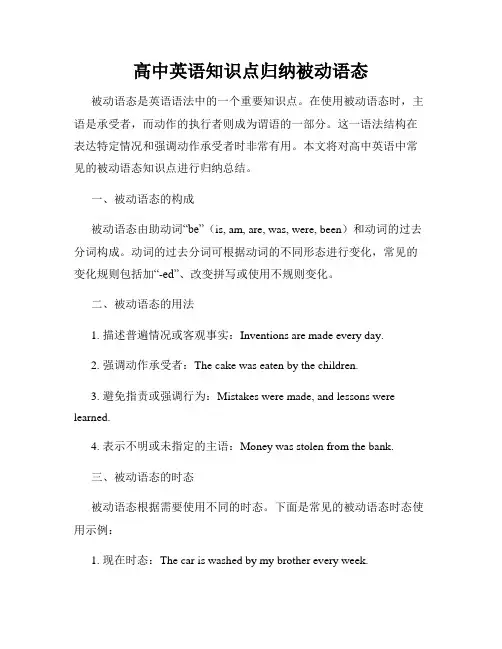
高中英语知识点归纳被动语态被动语态是英语语法中的一个重要知识点。
在使用被动语态时,主语是承受者,而动作的执行者则成为谓语的一部分。
这一语法结构在表达特定情况和强调动作承受者时非常有用。
本文将对高中英语中常见的被动语态知识点进行归纳总结。
一、被动语态的构成被动语态由助动词“be”(is, am, are, was, were, been)和动词的过去分词构成。
动词的过去分词可根据动词的不同形态进行变化,常见的变化规则包括加“-ed”、改变拼写或使用不规则变化。
二、被动语态的用法1. 描述普遍情况或客观事实:Inventions are made every day.2. 强调动作承受者:The cake was eaten by the children.3. 避免指责或强调行为:Mistakes were made, and lessons were learned.4. 表示不明或未指定的主语:Money was stolen from the bank.三、被动语态的时态被动语态根据需要使用不同的时态。
下面是常见的被动语态时态使用示例:1. 现在时态:The car is washed by my brother every week.2. 过去时态:The letter was sent yesterday.3. 将来时态:The contract will be signed next week.4. 现在进行时态:The house is being built by a group of workers.5. 现在完成时态:The book has been read by many people.四、被动语态与不定式、情态动词的使用1. 被动语态与不定式:The house needs to be repaired.2. 被动语态与情态动词:The project should be completed by tomorrow.五、被动语态的特殊情况1. 特殊疑问句:Where was the bag found?2. 感叹句:How beautifully the song was sung by the singer!3. 含有两个宾语的句子:We were given a gift by our friends.六、被动语态中的常见错误1. 错误的主语:The book is written by Shakespeare.(改为“The book was written by Shakespeare.”)2. 错误的时态:The photos were taken by me last weekend.(改为“The photos have been taken by me.”)通过对高中英语被动语态知识点的归纳总结,我们可以更好地理解和应用被动语态。
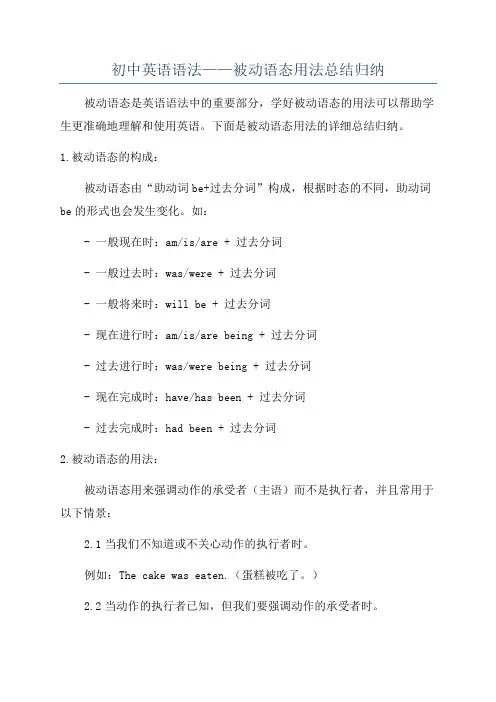
初中英语语法——被动语态用法总结归纳被动语态是英语语法中的重要部分,学好被动语态的用法可以帮助学生更准确地理解和使用英语。
下面是被动语态用法的详细总结归纳。
1.被动语态的构成:被动语态由“助动词be+过去分词”构成,根据时态的不同,助动词be的形式也会发生变化。
如:- 一般现在时:am/is/are + 过去分词- 一般过去时:was/were + 过去分词- 一般将来时:will be + 过去分词- 现在进行时:am/is/are being + 过去分词- 过去进行时:was/were being + 过去分词- 现在完成时:have/has been + 过去分词- 过去完成时:had been + 过去分词2.被动语态的用法:被动语态用来强调动作的承受者(主语)而不是执行者,并且常用于以下情景:2.1当我们不知道或不关心动作的执行者时。
例如:The cake was eaten.(蛋糕被吃了。
)2.2当动作的执行者已知,但我们要强调动作的承受者时。
例如:The house was built by my grandfather.(这座房子是我爷爷建的。
)2.3当我们要避免使用第一人称或第二人称时。
例如:Mistakes were made.(犯了错误。
)3.被动语态的注意事项:在使用被动语态时,需要注意以下几点:3.1表示动作的动词要用过去分词形式。
过去分词的形式有规律变化和不规律变化两种。
如:- 规律变化:原形 + ed,例如:played, watched, called- 不规律变化:需要记忆,例如:born, written, eaten3.2被动句的主语是动作的承受者,通常出现在句子的前面。
如:- 主动语态:I cooked dinner.(我做了晚饭。
)- 被动语态:Dinner was cooked by me.(晚饭是我做的。
)3.3 不及物动词不能构成被动语态。
不及物动词没有宾语,因此不能强调动作的承受者。
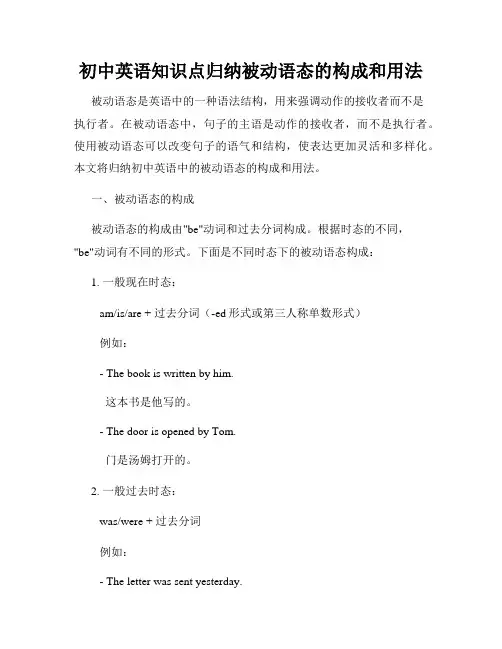
初中英语知识点归纳被动语态的构成和用法被动语态是英语中的一种语法结构,用来强调动作的接收者而不是执行者。
在被动语态中,句子的主语是动作的接收者,而不是执行者。
使用被动语态可以改变句子的语气和结构,使表达更加灵活和多样化。
本文将归纳初中英语中的被动语态的构成和用法。
一、被动语态的构成被动语态的构成由"be"动词和过去分词构成。
根据时态的不同,"be"动词有不同的形式。
下面是不同时态下的被动语态构成:1. 一般现在时态:am/is/are + 过去分词(-ed形式或第三人称单数形式)例如:- The book is written by him.这本书是他写的。
- The door is opened by Tom.门是汤姆打开的。
2. 一般过去时态:was/were + 过去分词例如:- The letter was sent yesterday.这封信昨天被寄出了。
- The cake was made by my mom.这个蛋糕是我妈妈做的。
3. 一般将来时态:will be + 过去分词例如:- The package will be delivered tomorrow.这个包裹将会在明天被送到。
- The decision will be made by the committee.决定将由委员会做出。
4. 现在进行时态:am/is/are being + 过去分词例如:- The house is being cleaned by the maid.这所房子正在被女佣清理。
- The project is being discussed by the team.这个项目正在团队讨论中。
5. 过去进行时态:was/were being + 过去分词例如:- The car was being repaired last week.这辆车上周正在维修。

初中英语语法——被动语态用法总结归纳被动语态是英语语法中的一种重要的句型结构,用来表示主语是动作的承受者,或者是主语被动地接受了其中一种行为或影响。
在被动语态中,动作的执行者通常不被说明,而动作的接受者(主语)成为句子的重点。
被动语态的结构是:“be”动词的适当形式 + 过去分词被动语态的时态、语态和主动语态一样,即可以变换时态(一般现在时、一般过去时、一般将来时等)和语态(进行时、完成时等)。
下面对被动语态的几个方面进行总结归纳。
1.一般现在时被动语态:一般现在时被动语态的结构是:“am/is/are”(be动词的适当形式)+ 过去分词例如:- 主动语态:They make cars.- 被动语态:Cars are made by them.2.一般过去时被动语态:一般过去时被动语态的结构是:“was/were”(be动词的适当形式)+ 过去分词例如:- 主动语态:She cooked dinner.- 被动语态:Dinner was cooked by her.3.一般将来时被动语态:一般将来时被动语态的结构是:“will be”(be动词的适当形式)+ 过去分词例如:- 主动语态:You will clean the room.- 被动语态:The room will be cleaned by you.4.进行时被动语态:进行时被动语态的结构是:“am/is/are being”(be动词的适当形式)+ 过去分词例如:- 主动语态:They are painting the wall.- 被动语态:The wall is being painted by them.5.完成时被动语态:完成时被动语态的结构是:“has/have been”(be动词的适当形式)+ 过去分词例如:- 主动语态:She has written a book.- 被动语态:A book has been written by her.需要注意的是,被动语态的主语通常不是动作的执行者,所以经常用于下面几种情况:-当动作的执行者不得而知或不重要时,使用被动语态。
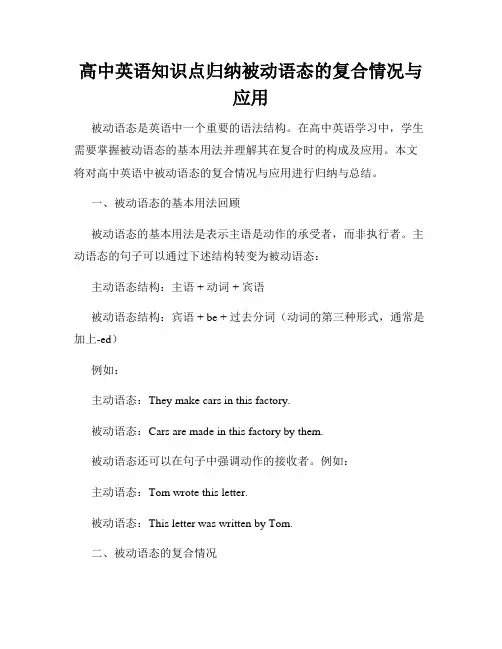
高中英语知识点归纳被动语态的复合情况与应用被动语态是英语中一个重要的语法结构。
在高中英语学习中,学生需要掌握被动语态的基本用法并理解其在复合时的构成及应用。
本文将对高中英语中被动语态的复合情况与应用进行归纳与总结。
一、被动语态的基本用法回顾被动语态的基本用法是表示主语是动作的承受者,而非执行者。
主动语态的句子可以通过下述结构转变为被动语态:主动语态结构:主语 + 动词 + 宾语被动语态结构:宾语 + be + 过去分词(动词的第三种形式,通常是加上-ed)例如:主动语态:They make cars in this factory.被动语态:Cars are made in this factory by them.被动语态还可以在句子中强调动作的接收者。
例如:主动语态:Tom wrote this letter.被动语态:This letter was written by Tom.二、被动语态的复合情况在一些特定的情况下,被动语态还需要使用助动词以及及物动词的双宾语结构。
下面是一些被动语态的复合情况:1. 被动语态的一般过去时复合情况在一般过去时的被动语态中,需要使用助动词“was”(或“were”)加上及物动词的过去分词。
例如:主动:He bought me a book yesterday.被动:I was bought a book by him yesterday.2. 被动语态的一般现在时复合情况在一般现在时的被动语态中,需要使用助动词“am”(或“is”/“are”)加上及物动词的过去分词。
例如:主动:They teach us English every day.被动:We are taught English by them every day.3. 被动语态的一般将来时复合情况在一般将来时的被动语态中,需要使用助动词“will be”加上及物动词的过去分词。
例如:主动:She will send us an email tomorrow.被动:We will be sent an email by her tomorrow.三、被动语态的应用被动语态广泛应用于各种不同的语境中,以下是其中一些常见的应用场景:1. 当执行者不重要或已知的情况下,使用被动语态来强调动作的接收者。
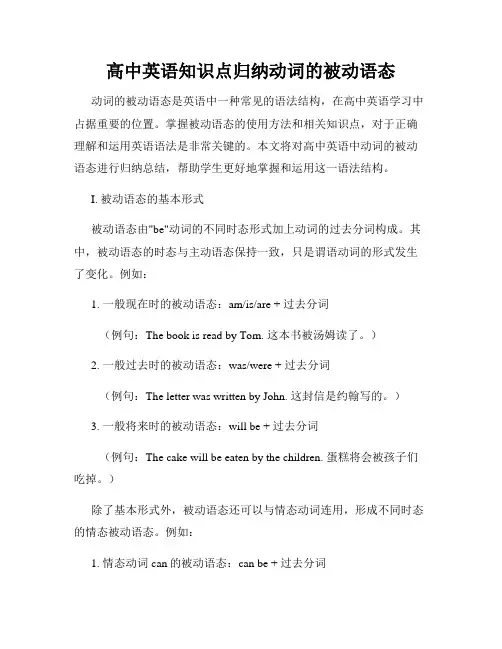
高中英语知识点归纳动词的被动语态动词的被动语态是英语中一种常见的语法结构,在高中英语学习中占据重要的位置。
掌握被动语态的使用方法和相关知识点,对于正确理解和运用英语语法是非常关键的。
本文将对高中英语中动词的被动语态进行归纳总结,帮助学生更好地掌握和运用这一语法结构。
I. 被动语态的基本形式被动语态由"be"动词的不同时态形式加上动词的过去分词构成。
其中,被动语态的时态与主动语态保持一致,只是谓语动词的形式发生了变化。
例如:1. 一般现在时的被动语态:am/is/are + 过去分词(例句:The book is read by Tom. 这本书被汤姆读了。
)2. 一般过去时的被动语态:was/were + 过去分词(例句:The letter was written by John. 这封信是约翰写的。
)3. 一般将来时的被动语态:will be + 过去分词(例句:The cake will be eaten by the children. 蛋糕将会被孩子们吃掉。
)除了基本形式外,被动语态还可以与情态动词连用,形成不同时态的情态被动语态。
例如:1. 情态动词can的被动语态:can be + 过去分词(例句:The problem can be solved by the teacher. 这个问题可以被老师解决。
)2. 情态动词should的被动语态:should be + 过去分词(例句:The car should be repaired by a professional mechanic. 这辆车应该由专业的机械师修理。
)II. 被动语态的用法1. 当我们不知道或不关心动作的执行者时,可以使用被动语态。
例如:(例句:The vase was broken. 这个花瓶被打破了。
)2. 当动作的承受者比执行者更重要或更值得强调时,可以使用被动语态。
例如:(例句:The cake was made by my grandmother.这个蛋糕是我奶奶做的。
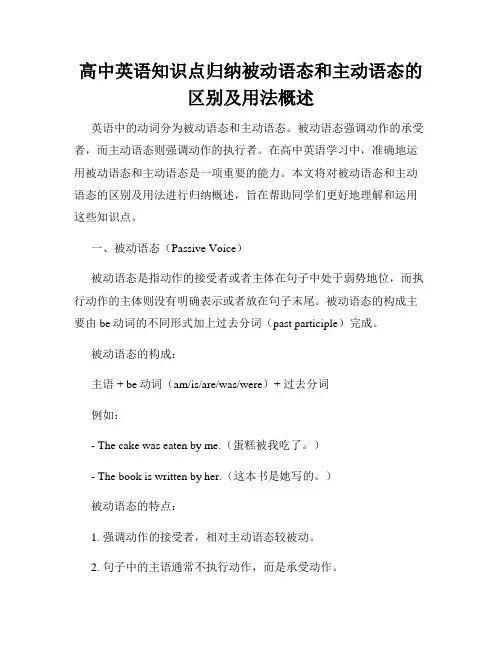
高中英语知识点归纳被动语态和主动语态的区别及用法概述英语中的动词分为被动语态和主动语态。
被动语态强调动作的承受者,而主动语态则强调动作的执行者。
在高中英语学习中,准确地运用被动语态和主动语态是一项重要的能力。
本文将对被动语态和主动语态的区别及用法进行归纳概述,旨在帮助同学们更好地理解和运用这些知识点。
一、被动语态(Passive Voice)被动语态是指动作的接受者或者主体在句子中处于弱势地位,而执行动作的主体则没有明确表示或者放在句子末尾。
被动语态的构成主要由be动词的不同形式加上过去分词(past participle)完成。
被动语态的构成:主语 + be动词(am/is/are/was/were)+ 过去分词例如:- The cake was eaten by me.(蛋糕被我吃了。
)- The book is written by her.(这本书是她写的。
)被动语态的特点:1. 强调动作的接受者,相对主动语态较被动。
2. 句子中的主语通常不执行动作,而是承受动作。
3. 被动语态常用于强调行为的结果或者主语本身不重要的情况。
4. 时态和语态之间的转换需要根据上下文来决定。
被动语态的应用:1. 掌握被动语态的常用时态,如一般现在时态(am/is/are + 过去分词)、一般过去时态(was/were + 过去分词)、一般将来时态(will be + 过去分词)等。
2. 特定情况下需要强调动作的结果或者受事者时,采用被动语态更为得体。
例如:The house was built by the workers last month.(这座房子是上个月工人们建造的。
)3. 注意被动语态的时态和语态转换,合理运用不同的时态来表达不同的动作状态。
4. 被动语态可以通过去掉动作执行者,使句子更加简洁明了,并且避免句子中出现过多的重复内容。
二、主动语态(Active Voice)主动语态是指动作的执行者或者主体在句子中处于主导地位。
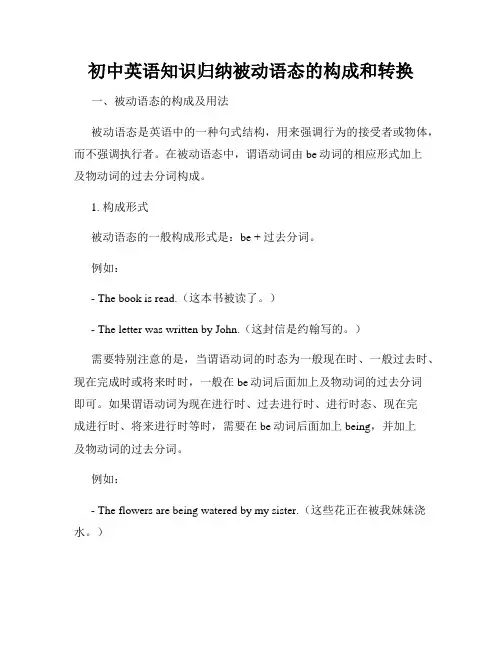
初中英语知识归纳被动语态的构成和转换一、被动语态的构成及用法被动语态是英语中的一种句式结构,用来强调行为的接受者或物体,而不强调执行者。
在被动语态中,谓语动词由be动词的相应形式加上及物动词的过去分词构成。
1. 构成形式被动语态的一般构成形式是:be + 过去分词。
例如:- The book is read.(这本书被读了。
)- The letter was written by John.(这封信是约翰写的。
)需要特别注意的是,当谓语动词的时态为一般现在时、一般过去时、现在完成时或将来时时,一般在be动词后面加上及物动词的过去分词即可。
如果谓语动词为现在进行时、过去进行时、进行时态、现在完成进行时、将来进行时等时,需要在be动词后面加上being,并加上及物动词的过去分词。
例如:- The flowers are being watered by my sister.(这些花正在被我妹妹浇水。
)- The house has been being built for a year.(这座房子已经建了一年了。
)2. 用法被动语态既可以用于主动句的转换,也可以用于被动句的强调。
它常用于以下几种情况:- 当发出者(即动作的执行者)不明确或不重要时。
- 当强调动作的接受者或物体时。
- 当谈论普遍道理、自然现象、客观规律等时。
例如:- The car was repaired yesterday.(这辆车昨天被修理了。
)- The house was destroyed in the earthquake.(这座房子在地震中被毁了。
)二、被动语态的转换被动语态的转换即由主动句转换为被动句,由被动句转换为主动句。
转换时需注意动词的时态和人称的变化。
1. 由主动句转换为被动句(1)将主动句的宾语移至句首成为主语。
(2)将原来的主语变为介词by或省略不说。
(3)谓语动词由主动态转换为被动态。
例如:- Active: Lucy wrote a letter.(主动:露西写了一封信。
初中英语知识点归纳被动语态与主动语态的用法区别英语中的动词既可以用主动语态表示主语执行动作,也可以用被动语态表示主语接受动作。
了解被动语态和主动语态的用法区别对于学习英语很重要。
本文将对初中英语知识点中被动语态和主动语态的用法进行详细归纳,帮助读者更好地理解和运用。
一、被动语态的构成1. 被动语态的基本结构:被动语态由助动词“be”(根据时态变化为不同形式)加上过去分词构成。
常见的助动词有am, is, are, was, were, been。
2. 被动语态的时态:被动语态的时态由助动词来表示,和主动语态的时态一致。
3. 被动语态的语气:被动语态可用于陈述句、疑问句和祈使句。
二、被动语态的使用场景1. 强调动作承受者:当不知道或不重要动作执行者是谁时,使用被动语态。
例句:The cake was eaten.(蛋糕被吃了。
)2. 描述自然现象或一般性事实:使用被动语态表达客观的真理。
Water is boiled at 100 degrees Celsius.(水被煮沸时会达到100度。
)3. 表达经验、感受或意见:使用被动语态使句子更客观、客观。
例句:We were surprised by the news.(我们被这个消息惊到了。
)三、主动语态的构成1. 主动语态的基本结构:主动语态由主语执行动作,动作的执行者在句子中处于主语的位置。
2. 主动语态的时态:主动语态的时态由动词本身的时态来表达。
3. 主动语态的语气:主动语态可用于陈述句、疑问句和祈使句。
四、主动语态的使用场景1. 强调动作执行者:当需要强调动作的主体时,使用主动语态。
例句:The cat caught the mouse.(猫抓住了老鼠。
)2. 描述事件或行为:使用主动语态来表达主观意愿或目的。
例句:I will bake a cake for your birthday.(我会给你的生日做一个蛋糕。
)3. 表达感受或意见:使用主动语态使句子更主观、直接。
英语语法被动语态知识点梳理在英语语法中,被动语态是一个重要且常用的语法点。
理解和掌握被动语态对于准确、流畅地表达意思以及提高英语语言能力都有着至关重要的作用。
下面咱们就来详细梳理一下被动语态的相关知识。
一、被动语态的构成被动语态的基本构成是“be +过去分词”。
其中,“be”动词要根据不同的时态和主语进行变化,过去分词则保持不变。
比如,一般现在时的被动语态是“am/is/are +过去分词”,一般过去时是“was/were +过去分词”,现在进行时是“am/is/are + being +过去分词”,过去进行时是“was/were + being +过去分词”,现在完成时是“have/has + been +过去分词”,过去完成时是“had + been +过去分词”等等。
举几个例子帮助大家理解:“ The book is written by him ”(一般现在时的被动语态)“ The tree was cut down yesterday ”(一般过去时的被动语态)“ The problem is being discussed now ”(现在进行时的被动语态)“ The work had been finished before he came ”(过去完成时的被动语态)二、被动语态的使用场景1、不知道或没必要指出动作的执行者当我们关注的是动作本身而不是执行者时,就会使用被动语态。
例如:“The window was broken ”(不知道是谁打破了窗户)2、强调动作的承受者为了突出动作的承受者,会使用被动语态。
比如:“This song is loved by many people ”(强调很多人喜欢这首歌,而不是强调谁让很多人喜欢这首歌)3、出于礼貌或委婉在某些情况下,使用被动语态可以使表达更委婉、更礼貌。
比如:“It is suggested that you should come earlier ”(用被动语态比直接说“ We suggest that you should come earlier ”更委婉)三、主动语态变被动语态的方法1、把主动语态中的宾语变成被动语态的主语。
英语被动语态知识点总结讲解英语的被动语态是英语语法中的一个重要的知识点,它的使用在英语的日常生活和商务场合中都很常见。
本篇文章将详细讲解英语中被动语态的构成、用法以及一些需要注意的地方。
构成英语中的被动语态的构成由“be”动词+过去分词组成,且需要注意的是,这里的“be”动词需要根据时态的不同而变化。
例如:•现在时态:am/is/are+过去分词•过去时态:was/were+过去分词•将来时态:will be+过去分词•现在完成时态:has/have been+过去分词•过去完成时态:had been+过去分词下面是一些示例:•主动语态:I ate a hamburger.(我吃了一个汉堡包。
)•被动语态:A hamburger was eaten by me.(一个汉堡包被我吃了。
)•主动语态:Tom is fixing the car.(汤姆正在修理车子。
)•被动语态:The car is being fixed by Tom.(车子正在被汤姆修理。
)•主动语态:The company will hire new employees.(公司将要招聘新员工。
)•被动语态:New employees will be hired by the company.(新员工将被公司招聘。
)用法英语中的被动语态虽然不像其他语言中那样常用,但在英语的日常生活中或者商务场合中,还是经常使用到的。
它主要的用法如下:1. 强调动作的承受者当我们需要强调动作的承受者时,就可以使用被动语态。
例如:•主动语态:Tom wrote the report.(Tom写了这个报告。
)•被动语态:The report was written by Tom.(这个报告是Tom写的。
)通过以上的例子,我们可以看到,在被动语态中,动作的承受者已经被强调了。
2. 强调动作的执行者当我们需要强调动作的执行者时,可以使用被动语态的反义词“get”语态即“get+过去分词”。
中考中的被动语态知识点总结与归纳被动语态是英语语法中一个重要的知识点,也是中考英语考试中常见的题型。
理解和掌握被动语态的用法对于学生来说至关重要。
本文将对中考中的被动语态知识点进行总结和归纳,帮助学生全面了解和掌握该知识点。
一、被动语态的构成和用法被动语态的构成:主语+be动词(根据时态变化)+过去分词被动语态的用法:1. 当我们不知道或不想提及动作的执行者时。
例句:The car was stolen last night.(昨晚这辆车被偷了。
)2. 当我们想强调动作的承受者时。
例句:The book was written by a famous author.(这本书是一位著名作家写的。
)3. 当我们想表达客观事实时。
例句:The Great Wall was built in the Qin Dynasty.(长城始建于秦朝。
)二、被动语态的各种时态1. 一般现在时的被动语态构成:am/is/are + 过去分词例句:The letter is written in English.(这封信用英语写的。
)2. 一般过去时的被动语态构成:was/were + 过去分词例句:The cake was eaten by the children.(蛋糕被孩子们吃掉了。
)3. 一般将来时的被动语态构成:will be + 过去分词例句:The meeting will be held next Monday.(会议将在下周一举行。
)4. 现在进行时的被动语态构成:am/is/are being + 过去分词例句:The house is being built at the moment.(这座房子正在建造中。
)5. 过去进行时的被动语态构成:was/were being + 过去分词例句:The car was being repaired when I arrived.(当我到达时,汽车正在修理中。
初中英语知识点归纳常用的被动语态和被动语态句型被动语态是英语语法中的重要内容之一。
在句子中,被动语态可用于强调动作的承受者,或者当我们的关注点是动作的执行者时。
本文将对常用的被动语态和被动语态句型进行归纳总结。
一、被动语态的构成及用法1. 构成:be动词(am/is/are/was/were)+过去分词(-ed结尾或不规则形式)2. 用法:强调承受动作的对象,或者当对动作进行描述时。
例如:Active: The cat chased the mouse.Passive: The mouse was chased by the cat.二、常用的被动语态句型1. 一般现在时被动语态结构:am/is/are + 过去分词用法:描述经常发生的动作或者普遍真理。
例如:Active: They build houses in this area.Passive: Houses are built in this area.2. 一般过去时被动语态结构:was/were + 过去分词用法:描述过去某个时间发生的动作或事件。
例如:Active: He repaired the car yesterday.Passive: The car was repaired by him yesterday.3. 现在进行时被动语态结构:am/is/are being + 过去分词用法:描述现在正在进行的动作或事件。
例如:Active: They are building a new bridge.Passive: A new bridge is being built by them.4. 过去进行时被动语态结构:was/were being + 过去分词用法:描述过去某一时刻正在进行的动作或事件。
例如:Active: He was writing a letter at that time.Passive: A letter was being written by him at that time.5. 现在完成时被动语态结构:has/have been + 过去分词用法:表达过去发生的动作对现在造成的影响或结果。
英语被动语态知识归纳英语被动语态知识归纳英语被动语态知识归纳英语中的被动语态使用得比汉语要多,要普遍,许多课本乃至实际应用中都常常涉及到这个问题。
一般说来,当强调动作承受者,不必说出执行者或含糊不清的执行者时,多用被动式。
须注意的是,许多地方与汉语不同。
注意那些汉语中没有"被……"的意思,英语却应该用被动态。
还要注意,英语的被动态往往由"by"引出,而有用介词"by"的短语往往又不是被动态,而是系表结构。
还有些特殊现象,如:known to man(人类......所知),on foot步行(美国人有时用by foot),in carraige(乘四轮马车)等等。
还有假主动,真被动的十几个常用词的用法,以及so heavy to carry而不用so heavy to be carried 等习惯用法。
有关这类情况,做到心中有数对全面掌握被动态,准确无误地解答习题非常关键,被动态必须涉及的是动词的各种时态变化的问题。
英语的时态本来很复杂,怎样记住各自的被动形式呢? 首先要明确"将来进行无被动,现在完成进行同"。
这两种时态无被动形式。
另外,不及物动词带有同源宾语的动词,反身代词的动词和系动词都无被动形式。
即便如此,还有不定式,动名词,分词,以及它们的复合结构)的被动态,再加上情态动词,助动词以及它们的疑问式和否定式从中掺杂,真是令人头痛,眼花缭乱。
下面口诀就以动词do为例,即do did过去式done过去分词,以口诀形式总结各种时态的被动态,一定对你有所启示。
被动语态(一般现在时)主动语态变被动语态时,主动语态句中的宾语变成被动语态句中的主语,主动语态句中的主语成为被动语态句中的动作的发出者。
被动语态的口诀一般现、过用be +PP(过去分词),be有人称、时、数变。
完成时态have(has) done,被动将been加中间。
一般将来shall (will) do,被动变do为be done。
将来进行无被动,shall (will) be doing, 现在完成进行同,have (has) been doing。
现、过进行be doing, 被动be加being done。
情、助、有、是妥安排,一律随新主语变。
否定助后加not,疑问一助置主前。
主语恰是疑问词,直陈语序主在前。
一般情助加be done,双宾多将间宾变。
复合宾语宾变主,宾补、主补相应变。
第二句"be有人称、时、数变"即be有人称、时态和单、复数的变化。
"情助"是指情态动词和助动词must,may,can,shall,will等一律随新主语(多是主动句中的宾语)来变化。
"疑问一助置主前"是说有两个助动词的话,应把主语放在第一助动词之后或把第一助动词置于主语之前。
下面详细举例说明之。
一般现、过用be done, be有人称、时、数变例:1、主动:The children gave the foreign guests a warm welcome. 被动:The foreign guests were given a warm welcome by the children. 孩子们热烈地欢迎外宾。
2、主动:People regard him asbrilliant. 被动:He is regarded as brilliant by people. 人们认为他很有才华。
以上两例都是一般时态用be done的例子,be 有人称、时、数变,第三人称foreign friends是复数,时态一般过去时,所以"be done"就是were given,而People regard him as brilliant一句,被动后的"be done"就变成单数第三人称is regarded的形式了。
被动:This speech was delivered by comrade Wang. (was delivered即一般过去时的被动态) 这篇讲演是王的发言。
There was a serious train accident near the border. Two people were killed and twelve were injured. 边境发生严重列车事故,两人死亡,十二人受伤。
A person who is truly honest is called a straight arrow. 直言不讳的人才是真正诚实的人。
A note was passed up to the speaker. 有人给讲演者递上来一张纸条。
John was elected president of the class instead of Harry. 乔治被选为班长而代替了亨利。
V olcanoes are described as active, dormant or extinct. 火山被描述为活的,沉睡着的,或者死的。
The soldier was killed, but the train was saved. 这位战士牺牲了,然而列车得救了。
He was thought to be clever but dishonest. 他被认为很聪明但不诚实。
(别人认为他很聪明但不诚实)The first zoological garden in the United States was established in 1874. 美国的第一个动物园是1874年建立的。
Families were often broken up; wives were taken away from their husbands and children from theirparents. 家庭被拆散,妻儿被夺走。
The information is urgently needed. 急需这个资料。
Most environmental problems exist because adequate measures for preventing them were not taken in the past. 多数环境污染问题的存在,是因为过去没有采取适当的保护措施。
完成时态have done,被动将been加中间。
(过去完成时had done也包括在内)。
例:1、主动:We have studied English for 3 years off and on at the spare-time school. 被动:English has been studied for 3 by us years off and on at the spare-time school. (have随新主语变为has) 我们已经在夜校里断断续续地学了三年英语了。
2、主动: They had produced 100 tractors by the end of last year. 被动: 100 tractors had been produced by the end of last year. 到去年年底我们已生产出一百台拖拉机。
3、主动:They have set up a power station in their home town. 被动:A power station has been set up in their home town. 他们的家乡建立了一座发电站。
4、主动:They have warned us to be careful of rats. 被动:We have been warned to be careful of rats. 他们已提醒我们要注意老鼠。
5、主动:People have piled plastic bags full of rubbish in streets. 被动: Plastic bags full of rubbish have been piled in streets. 人们把装满垃圾的塑料袋子堆放在街上。
6、主动:We have used nuclear energy to produce electricity. 被动:Nuclear energy has been used to produce electricity. 核能已用来发电。
7、主动:No one has ever beaten him at tennis. 被动:He has never been beaten at tennis. 就网球来说还没有人是他的对手。
(No one涉及到全否定和部分否定问题,见否定一讲) The person who owns the gun may try to deny that he has used it. But anyone seeing the smoke knows the gun has just been fired. 有枪的人会极力否认他开了枪。
但是任何看到枪烟(枪冒的烟)的人都会知道刚才开了枪。
Today is Cilia's wedding day, she has just been married to Danel. 今天是西丽亚的新婚日,她刚刚和丹尼尔结婚。
The subjects of these lectures have been announced by the lecture committee. 演讲委员会已宣布了这些讲演的题目。
过去完成时也是一样:主动: Somebody had cleaned my shoes. 被动: My shoes had been cleaned by somebody. 有人早已把我的鞋子擦了。
When I returned I found that they had towed (toud) my car away, I asked why they had done this and they told me that id was because I had parked it under a "No Parking Sign". 被动:my car had been towed away. I asked why this had been done and told that ... it had been parked under a "No Parking Sign". 当我回来时,发现我的车被弄走了。